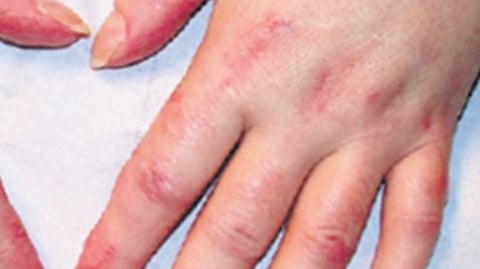

CHENNAI : Imagine a world where our bodies sometimes get confused and start attacking themselves, causing all sorts of chaos inside. There is a condition such as this and it is called dermatomyositis — a rare but impactful disorder where muscles and skin become battlegrounds for the immune system’s misdirected fury.
The muscles and skin become inflamed due to the body’s immune system attacking itself. Unlike other muscle inflammation conditions, dermatomyositis also causes skin rashes.
Recently, the tragic passing of actor Suhani Bhatnagar, renowned for her portrayal of young Babita Phogat in the acclaimed wrestling drama Dangal, has brought the gravity of dermatomyositis to the forefront. Her family disclosed that she had been battling this condition, shedding light on the profound challenges it poses to individuals’ lives.
Dermatomyositis is pretty uncommmon, affecting about 1 to 10 people per million each year. When it comes to kids with dermatomyositis, known as juvenile dermatomyositis (JDM), there’s a whole different ball game compared to adults. Typically cropping up in children and teens, especially between the ages of 5 and 10, JDM shows up with familiar symptoms like muscle weakness and skin rash, just like it does in grown-ups. But here’s where it gets interestings — kids with JDM might also deal with tummy troubles, achy joints, and even fevers. Plus, their bellies might give them a hard time with stuff like swallowing or bleeding more often than adults.
Dermatomyositis can be extremely painful. Imagine your muscles feeling achy and weak, making it hard to do everyday things like walking or even picking up objects. It can really disrupt your daily life and make you feel pretty miserable. Life expectancy can vary depending on how severe the condition is and how well one responds to treatment.
Diagnosing dermatomyositis in children involves a bunch of different tests, like looking at their skin, checking their muscle strength, and doing blood tests. Doctors use all this information to piece together a picture of what’s going on in their body. We’re not entirely sure what causes dermatomyositis, but it seems to be a mix of genetics and environmental factors. Some kids might be more likely to get it if they have certain genes, but it’s not something you can predict or control.
Treatment usually involves a mix of medicines to help calm down the inflammation and strengthen the muscles. The exact approach depends on how severe the condition is and what other health issues the child might have. Dermatomyositis can make it hard for kids to do things they enjoy, like going to school or playing sports, because of muscle weakness and fatigue. It can be frustrating and make them feel left out from their friends. Kids with dermatomyositis can benefit from things like physical therapy to help strengthen their muscles and manage their symptoms. It’s all about finding ways to make life a bit easier for them. Physical therapy is a big part of managing dermatomyositis in kids. It helps them build up their strength and learn ways to move that don’t put too much strain on their muscles. Eating a balanced diet and staying healthy can help support a child’s overall well-being, but there aren’t any specific foods or supplements that treat dermatomyositis directly.
Dermatomyositis can have long-term effects on a child’s body and mind. Physically, it can lead to things like muscle weakness, joint stiffness, and even problems with breathing. Emotionally, it can cause anxiety and depression, especially if it affects their ability to do things they enjoy. With proper care, many people with dermatomyositis can live long and fulfilling lives. Unfortunately, dermatomyositis isn’t something you can prevent. It’s not caused by anything you do or don’t do — it’s just one of those unlucky things that happen sometimes. It’s all about taking things one step at a time and finding what works best for each child.
(The writer is lead consultant — rheumatology, Aster Whitefield Hospital, Bengaluru) Dr Yathish G C